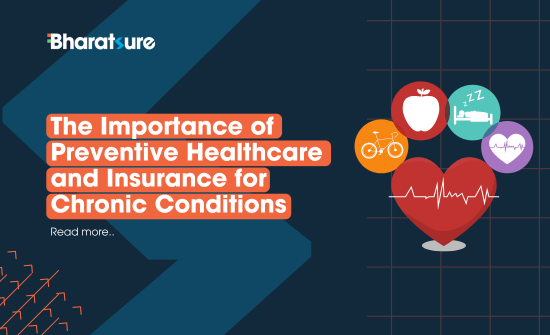In today’s fast-paced world, prioritizing our health has become more crucial than ever. The significance of preventive healthcare and insurance in managing chronic conditions cannot be overstated. With the increasing prevalence of chronic illnesses like diabetes, it is imperative to adopt proactive healthcare measures for a healthier future.
As individuals, we often underestimate the power of preventive healthcare in combating chronic conditions. By investing in regular check-ups, screenings, and vaccinations, we can detect potential health issues early on and take necessary steps to prevent their progression. Furthermore, incorporating lifestyle modifications such as a balanced diet and regular exercise can significantly reduce the risk of developing chronic illnesses.
Health insurance plays a pivotal role in supporting our preventive healthcare endeavors. Comprehensive insurance plans that cover preventive measures and long-term management of chronic conditions, including diabetes care, provide us with the peace of mind and financial assistance needed to address health challenges effectively.
Knowing Chronic Diseases
| Chronic Disease | Meaning | Symptoms | Cure/Management |
| Diabetes | A condition characterized by high blood sugar levels. | Increased thirst, frequent urination, fatigue, blurred vision | No cure; managed with medication, diet, exercise |
| Hypertension | A condition with consistently high blood pressure. | Often asymptomatic; headaches, shortness of breath, nosebleeds | No cure; managed with lifestyle changes, medication |
| Heart Disease | A range of conditions affecting the heart. | Chest pain, shortness of breath, fatigue, irregular heartbeat | No cure; managed with medication, surgery, lifestyle changes |
| Asthma | A condition where airways become inflamed and narrow. | Wheezing, shortness of breath, chest tightness, coughing | No cure; managed with inhalers, medication, avoiding triggers |
| Arthritis | Inflammation of the joints causing pain and stiffness. | Joint pain, swelling, reduced range of motion, stiffness | No cure; managed with medication, physical therapy, lifestyle changes |
| Depression | A mental health disorder characterized by persistent sadness. | Persistent sadness, loss of interest, changes in sleep and appetite | No cure; managed with medication, therapy, lifestyle changes |
Why Preventive Healthcare matters?
- Early Detection:
- Identifies chronic conditions at an early stage.
- Allows for timely intervention and management.
- Reduced Disease Progression:
- Prevents or slows the progression of chronic diseases.
- Helps maintain better health and functionality over time.
- Cost Savings:
- Reduces long-term healthcare costs by preventing expensive treatments and hospitalizations.
- Lowers overall medical expenses for individuals and healthcare systems.
- Improved Quality of Life:
- Enhances overall well-being and daily functioning.
- Reduces the severity and frequency of symptoms.
- Decreased Complications:
- Prevents complications associated with chronic diseases.
- Reduces the risk of comorbid conditions.
- Better Health Outcomes:
- Leads to improved long-term health outcomes.
- Increases life expectancy and overall health.
Sample Preventive Healthcare Plan
| Meal | Food Group and Portion Size | Example Foods |
| Breakfast | Protein, whole grains, fruits, juice | Scrambled eggs, whole wheat toast, fruit juice |
| Mid-Morning Snack | Nuts, fruits, biscuit | Handful of almonds, apple, whole wheat biscuit |
| Lunch | Lean protein, vegetables, whole grains | Grilled chicken breast, atta roti (whole wheat flatbread), mixed vegetables |
| Afternoon Snack | Dairy or dairy alternative, chocolate | Greek yogurt, piece of sugar-free dark chocolate |
| Dinner | Fish or lean meat, vegetables | Baked fish, Low-carb atta roti, steamed vegetables |
| Evening Snack | Whole fruits or vegetables | Carrot sticks with hummus |
Insurance’s Vital Role
- Reduces High Medical Costs: Chronic diseases often require expensive, long-term treatments and medications. Insurance helps cover these costs, reducing the financial burden on individuals.
- Ensures Access to Necessary Treatments and Medications: Insurance ensures that individuals with chronic conditions have access to the necessary treatments and medications, which might otherwise be unaffordable.
- Provides Access to Specialists: Managing chronic diseases often requires specialist care. Insurance plans typically provide access to a network of specialists, facilitating proper disease management.
- Supports Routine Check-Ups: Regular monitoring and check-ups are crucial for managing chronic conditions effectively. Insurance covers these routine visits, promoting ongoing health management.
- Helps Manage Disease Progression: By providing coverage for necessary treatments and regular monitoring, insurance helps in controlling and slowing the progression of chronic diseases.
- Covers a Wide Range of Healthcare Services: Insurance plans typically offer comprehensive coverage, including preventive, diagnostic, and therapeutic services necessary for managing chronic diseases.
Safeguarding Wellness: Preventive Care and Insurance for Chronic Illnesses
It is evident that prioritizing preventive healthcare and having adequate insurance coverage are crucial elements in effectively managing chronic conditions such as diabetes. By incorporating regular check-ups, screenings, vaccinations, and lifestyle modifications into our healthcare routine, we can significantly reduce the risks associated with chronic illnesses.
Health insurance plays a vital role in ensuring access to timely and quality care for chronic conditions. Comprehensive insurance plans that cover preventive measures and long-term management are essential in easing the financial burden on individuals dealing with chronic illnesses.
It is clear that wellness programs, health screenings, and insurance coverage can empower individuals to take charge of their health proactively. These benefits not only contribute to the well-being of employees but also help in reducing healthcare costs for employers.
By staying proactive and informed about our health, we can lead healthier and more fulfilling lives while effectively managing chronic conditions.
FAQs
- Why is preventive healthcare important for managing chronic conditions?
Preventive healthcare plays a crucial role in managing chronic conditions by detecting issues early on, promoting healthy lifestyles, and preventing potential complications. - How does insurance help in managing chronic conditions?
Insurance provides financial support for the ongoing management of chronic conditions, covering medical expenses, prescription medications, and specialized treatments. - What preventive measures can individuals take to prevent chronic conditions?
Individuals can maintain a healthy diet, engage in regular exercise, undergo routine screenings, and follow medical advice to reduce the risk of developing chronic conditions. - Why is early detection key in managing chronic conditions effectively?
Early detection allows for prompt intervention, timely treatment, and better disease management, potentially improving outcomes and quality of life for individuals with chronic conditions. - What role does regular check-ups and screenings play in preventive healthcare for chronic conditions?
Regular check-ups and screenings help in monitoring health status, identifying risk factors, and initiating preventive measures to address potential health issues before they progress into chronic conditions.



